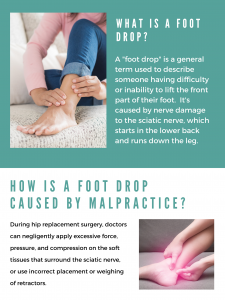Nearly a quarter of a million Americans undergo total hip replacement surgery. All of them do so reluctantly. This invasive orthopedic surgery is a major operation. Everyone agrees that there are unavoidable risks involved in the procedure. These risks include a foot drop (also called peroneal nerve palsy or drop foot), sciatic nerve injuries, and, many believe, RSD even when the surgery is performed properly. There is no doubt that the fact that it is a known complication of hip replacement surgery does not make for a straightforward malpractice case no matter how egregious the facts are. I’m telling you that the surgeon could do the operation with a machete while wearing a Groucho Marx mask and any Maryland insurance company would still mount a defense. But that does not answer the question posed, which is whether it can be medical malpractice when a patient has a foot drop after a total hip replacement. Continue reading
Articles Posted in Medical Malpractice
Getting to the Maryland Courthouse Steps in Malpractice Cases
 Bringing a medical malpractice case in Maryland is not something that most lawyers are competent to do. Maryland law makes you jump through a lot of administrative hoops when filing malpractice cases. Experienced malpractice lawyers have screwed up the procedural requirements for bringing a claim. Maryland law and its courts are more than willing to hold a victim’s feet to the fire on technical details that really would not be of consequence if the system was truly interested in allowing victims access to justice.
Bringing a medical malpractice case in Maryland is not something that most lawyers are competent to do. Maryland law makes you jump through a lot of administrative hoops when filing malpractice cases. Experienced malpractice lawyers have screwed up the procedural requirements for bringing a claim. Maryland law and its courts are more than willing to hold a victim’s feet to the fire on technical details that really would not be of consequence if the system was truly interested in allowing victims access to justice.
Ford v. United States | New Maryland Malpractice Opinion
 A U.S. federal court judge made a ruling on some motions that would interest Maryland medical malpractice attorneys. They deal with a motion for summary judgment and a pet interest of mine, holding the defendant’s feet to the fire when they give garbage answers to requests for admission.
A U.S. federal court judge made a ruling on some motions that would interest Maryland medical malpractice attorneys. They deal with a motion for summary judgment and a pet interest of mine, holding the defendant’s feet to the fire when they give garbage answers to requests for admission.
This is a birth injury claim against Defendants Calvert Memorial Hospital of Calvert County, that hospital’s emergency room and emergency room doctor, and the United States. The government is a defendant for the care given at Andrews Air Force Base.
Plaintiff got prenatal care on Andrews Air Force Base. A month before delivering, the mom-to-be presented with high blood pressure and had laboratory studies with elevated proteins, symptoms that show some risk of preeclampsia. Three weeks later, the woman gives birth to her daughter at Calvert Memorial Hospital.
Medical Malpractice Settlement Formula? How to Value Cases
 Most malpractice lawsuits in Maryland are resolved after negotiating through adversarial bargaining. At the end of the day, our clients only have two options: settle or go to trial. Sometimes, they do not even have two options. We have tried medical malpractice cases where there was no settlement offer.
Most malpractice lawsuits in Maryland are resolved after negotiating through adversarial bargaining. At the end of the day, our clients only have two options: settle or go to trial. Sometimes, they do not even have two options. We have tried medical malpractice cases where there was no settlement offer.
Is There a Formula to Determine the Value of Medical Malpractice Cases?
There is a settlement formula to determine the value of a medical malpractice claim. The formula has four parts:
Fee Splitting or Referral Fees in Maryland Medical Malpractice Cases
 Most of the medical malpractice cases Miller & Zois handles come from cases that are referred from other Maryland attorneys. These cases come from other lawyers who do not focus their practice on medical malpractice cases, or the size and the expenses in the case or the specific issues presented are such that getting other counsel involved makes the most sense.
Most of the medical malpractice cases Miller & Zois handles come from cases that are referred from other Maryland attorneys. These cases come from other lawyers who do not focus their practice on medical malpractice cases, or the size and the expenses in the case or the specific issues presented are such that getting other counsel involved makes the most sense.
What Type of Referring Lawyer Fee Splits Do You Do?
In these cases, we do a 70%-30% fee split with the referring law consistent with Maryland Rule 1.5 in medical negligence cases. Our firm fronts and bears the risk of all costs and expenses. I put that 70%-30% number right out there because fee splits always seem cloaked in mystery. The only information online that involves fee splits comes from appellate opinions. So we want to get it out there.
Who Is Defending Maryland Medical Malpractice Cases?
 The medical malpractice arm of our law firm has continued to grow over the last 10 years. I think it is interesting to see who the defense lawyers are in these cases. It matters who you draw as defense counsel. You would think, as a plaintiff’s lawyer, you would like to draw the least competent counsel as possible.
The medical malpractice arm of our law firm has continued to grow over the last 10 years. I think it is interesting to see who the defense lawyers are in these cases. It matters who you draw as defense counsel. You would think, as a plaintiff’s lawyer, you would like to draw the least competent counsel as possible.
There is some truth to this. Lazy and incompetent counsel sometimes miss key defenses and critical arguments that the health care providers should make. But this rule has a lot of exceptions. Defense lawyers who get behind the eight ball sometimes make it even harder on us. Because it is impossible to schedule depositions, get discovery responses, and otherwise push the case forward. You usually get to the same place in the end, but sometimes the workload doubles just because the other side is so unresponsive. Sometimes, particularly if you have a quality liability case, you are best served by having quality defense lawyers who do what it takes to properly defend the case.
Judge Decides to Ignore Cap in Non-Economic Damages
 Last month in a medical malpractice case in Milwaukee, a judge did something pretty amazing. Here is the setup. A woman has both her arms and legs amputated because of a Strep A infection and the treatment she received for septic shock, resulting in compromised blood flow. This is, no question, a stunningly awful tragedy. A jury believed that medical malpractice caused these injuries and awarded $15.75 million in pain and suffering damages and $9 million in economic damages. But Wisconsin has a $750,000 cap on non-economic damages that the trial judge, in this case, believed was constitutionally sound. So that’s that, right?
Last month in a medical malpractice case in Milwaukee, a judge did something pretty amazing. Here is the setup. A woman has both her arms and legs amputated because of a Strep A infection and the treatment she received for septic shock, resulting in compromised blood flow. This is, no question, a stunningly awful tragedy. A jury believed that medical malpractice caused these injuries and awarded $15.75 million in pain and suffering damages and $9 million in economic damages. But Wisconsin has a $750,000 cap on non-economic damages that the trial judge, in this case, believed was constitutionally sound. So that’s that, right?Although the cap may be constitutional as applied to medical malpractice victims as a whole, there is no rational justification for depriving Mrs. Mayo, who is in her mid-fifties, limbless, and largely immobile, and Mr. Mayo of the award the jury decided was appropriate to compensate them for their injuries…”
It is unreasonable to require Mrs. Mayo and her husband, whose lives have been so drastically altered, to bear the brunt of the legislature’s intended tort reform…. there is no rational basis [for slashing the award] in the hopes of marginally improving health care in Wisconsin.
Challenges in Scheduling Depositions | Pennsylvania Case
 Scheduling depositions in car accident lawsuits usually is not a complex thing. You call the other side; you agree on dates, and you have your depositions. The key is cooperation. Rather than unilaterally serving a deposition notice, you just call opposing counsel and agree to the place, date, and time. There are rare issues.
Scheduling depositions in car accident lawsuits usually is not a complex thing. You call the other side; you agree on dates, and you have your depositions. The key is cooperation. Rather than unilaterally serving a deposition notice, you just call opposing counsel and agree to the place, date, and time. There are rare issues.
For some reason, and I’m not entirely sure why, but scheduling depositions in medical malpractice cases always seems to be an ordeal. Common courtesies that I’m sure many Maryland malpractice lawyers accord each other in the rest of our lives sometimes go out the window. Sometimes, it seems like otherwise ethical lawyers have no qualms about making up excuses for why they or the deponents cannot attend a deposition that are not based in fact. Often, you can figure this out when you depose the witness. Continue reading
Why Can’t I Find a Malpractice Lawyer for My Case?
 Medical malpractice kills 400,000 people a year in this country and injures 4 million more. The media is now starting to focus on this story, as we just talked about on Monday after the Baltimore Sun’s story on negligence in Maryland hospital. Stories like this help plaintiffs in medical malpractice cases. Why? Because many of us still view doctors as infallible and that wall of invincibility is being to fall.
Medical malpractice kills 400,000 people a year in this country and injures 4 million more. The media is now starting to focus on this story, as we just talked about on Monday after the Baltimore Sun’s story on negligence in Maryland hospital. Stories like this help plaintiffs in medical malpractice cases. Why? Because many of us still view doctors as infallible and that wall of invincibility is being to fall.
So, why is it so hard to find a medical malpractice lawyer in Maryland who will take your case?
Joanna Shepherd, a law professor at Emory University, conducted a national survey of medical malpractice attorneys that explored why malpractice attorneys reject cases.
| Reason for Rejection Case | Percent of Respondents |
| Unclear causation | 19.25% |
| Unclear evidence of malpractice | 29.11% |
| Case is unlikely to settle | 0.94% |
| Insufficient damages expected from trial or settlement | 38.73% |
| Complexity and expense of bringing the claim | 11.74 |
| Hospital not involved in medical malpractice | 0.23% |
Maryland Hospital Errors | How Many?
 The Baltimore Sun published an important front-page article yesterday on hospital errors in Maryland.
The Baltimore Sun published an important front-page article yesterday on hospital errors in Maryland.
The premise of the article is a simple yet different approach to medical mistakes in Maryland hospitals. It goes like this. We have about 400,000 patients who are killed every year by medical malpractice.
How are Maryland hospitals faring? We don’t know. There is a major epidemic that kills enough people in this county to fill Camden Yards 10 times a year. Malpractice that causes serious injury could fill Camden Yards over 100 times (4,000,000) a year. Yet we have no quality way of estimating how Maryland is faring. Why is this? The hospitals, doctors, and insurance companies do not provide this data to us.
Said differently, we are all particularly those of us that are young or old – vulnerable to this grave risk. We face other risks, of course. Heart disease, cancer, motor vehicle accidents, diabetes, all pose substantial risks of death. With these risks, we can sift through the data, understand the risks, and do what we can. We quit smoking, eat better, wear seat belts, and so forth.
 Maryland Injury Law Center
Maryland Injury Law Center


